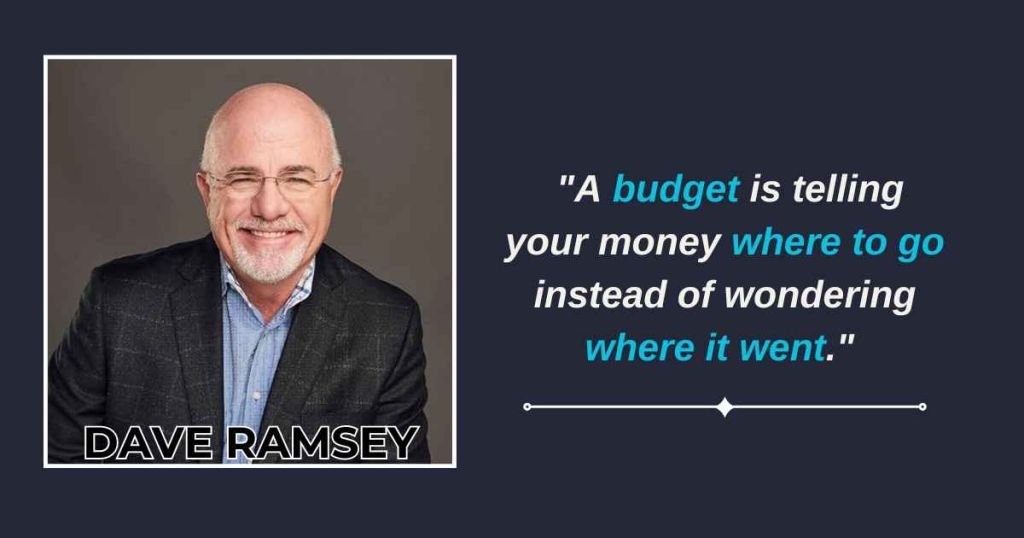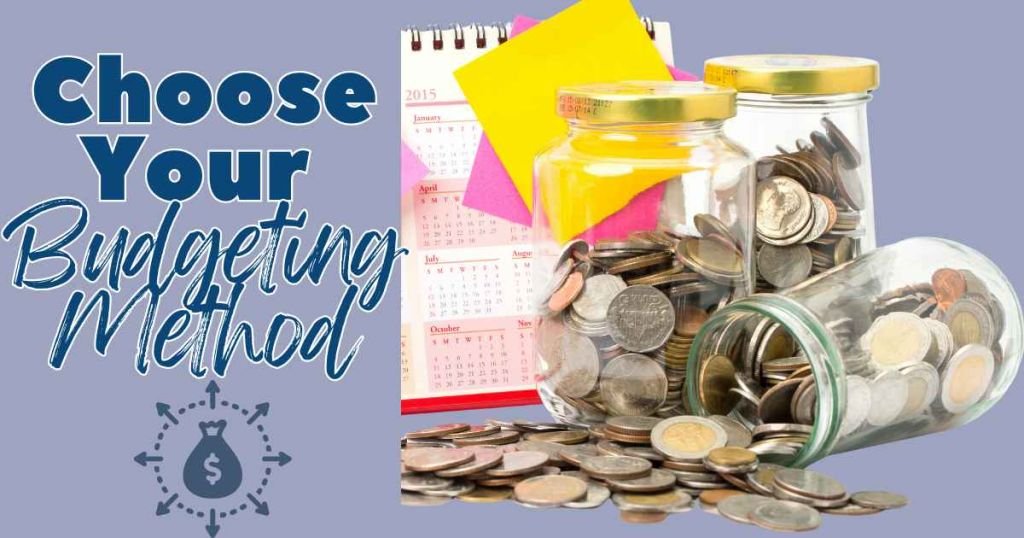Imagine having complete control over your finances, never worrying about unexpected expenses, and steadily growing your savings—this is the power of a well-crafted budget.
A budget is a plan for your money, showing where it should go to maximize your earnings. Moreover, by assigning each dollar a job and setting spending limits, a budget ensures wise money use. However, creating a budget tailored to your needs is essential for developing good spending habits, saving for the future, and making the most of your money.
What Is A Budget?

According to Dave Ramsey “A budget is telling your money where to go instead of wondering where it went.” A budget is a plan that predicts how much money you will earn and spend in the future. However, budgeting happens regularly as people review and adjust their budgets to fit their needs and goals.
A budget (or money plan) is just a simple way to plan your spending. Basically, your money plan:
- Helps you manage your money and stay in control
- Shows what money you expect to get and how you plan to spend it
- Helps you direct your money towards your goals
- Is one of the best tools for making the most of your money and moving forward.
8 Steps To Start A Budget
1. Understand Why You Want To Budget

Research shows only about a third of households stick to a strict budget. By budgeting, you’re in a smaller group — and it pays off. Those who budget are nearly twice as likely to have no financial worries compared to free spenders. They’re also less likely to live paycheck or struggle with money.
Before you start budgeting, think about your goals. Your reasons for budgeting can affect your choices. Here are common reasons people budget:
- Save more money
- Cut overspending
- Resolve money issues for couples
- Align spending with goals and values
- Break the paycheck-to-paycheck cycle
- Avoid debt
- Reach long-term financial goals
Understanding why you’re budgeting is important for managing money effectively. However, research from the University of Maryland reveals that budgeting helps achieve goals by fostering emotional commitment, boosting motivation, and curbing overspending temptations.
2. Examine Your Current Spending Habits

Before creating a realistic budget, understand your current spending. Track your expenses for 30 days to get a clear picture. Here are some ways to do it:
- Write it down: Record every purchase in a notebook or spreadsheet. This method is detailed but time-consuming.
- Use an app: Apps like Mint, Dollarbird, and PocketGuard link to your accounts and track spending automatically.
- Review statements: Look at your credit card and bank statements to see where your money goes. This method is less detailed but quick to start a budget.
Moreover, understanding where your money goes is essential for a realistic budget, as many people are unsure of their actual spending.
3. Use A Calendar For Irregular Expenses Planning

Tracking daily spending is important, but your budget also needs to cover irregular costs like holidays and birthdays.
A study by the American Institute of CPAs found that 58% of people who use a calendar to track irregular expenses report feeling more in control of their finances. However, by budgeting for these expenses all year, you can avoid holiday debt. Some irregular expenses to include in your budget are:
- Christmas, Hanukkah, or other gift-giving holidays
- Birthdays
- Annual car inspections and registrations
- Annual vacations
- Property taxes
- Professional dues
- Annual insurance premiums
- Annual medical exams, including vet exams
Furthermore, your calendar and past credit card statements can help you list all the expenses that come up throughout the year.
4. Add Up All Your Income

Budgeting is about using your money wisely, so you need to know how much money you have coming in. Include income from all sources like:
- Your job
- Side jobs
- Alimony or child support
- Business earnings
- Investment income
If your income varies, try paying yourself a fixed salary each month. Moreover, set a budget based on an average or lean month’s earnings, and save any surplus for lower-earning months to avoid overspending. Alternatively, use the previous month’s earnings to plan your budget for the next month. This requires more effort but can improve financial management.
5. Identify Your Personal Financial Goals

Most people create a budget because they want to achieve more with their money. This often includes long-term goals like:
- Saving for retirement
- Building an emergency fund
- Buying a house
- Purchasing a new vehicle with cash
- Paying off debt
- Saving for college
- Saving for a vacation or other big purchases
When you set goals, you can adjust your budget to help achieve them by deciding how much money to set aside for each one. Studies have shown that setting goals increases motivation and success.
Setting goals is the most important part of making a budget. Without goals, you’re just shifting your spending and won’t see any real progress with your money.
6. Decide How Much To Save

Once you’ve set your financial goals, the next step is to calculate how much you need to save for each one. Moreover, this involves breaking down your goals into manageable milestones and determining the amount of money required to achieve them within your desired timeframe.
Planning for big goals like college, a house, or retirement can be challenging. Explore these guides for assistance:
- Retirement savings calculator
- Home affordability calculator
- College savings planner
Setting specific savings targets keeps you focused and motivated, ensuring consistent progress towards your financial goals. Moreover, regularly reviewing and adjusting these targets as your situation changes helps you effectively plan and achieve your aspirations.
7. Plan A Family Meeting

If you’re single, you don’t need to get anyone else on board. But if you have a partner, budgeting is a team effort.
- Money and Relationship Stress: Money is a significant source of stress in relationships. According to a SunTrust Bank survey, 35% of couples reported that money caused problems.
- Importance of Alignment: If you and your partner aren’t aligned on financial goals, budget plans can falter. However, differences may lead to impulsive spending or disagreements over expenses.
- Communication is Key: Schedule a meeting to discuss finances, even with separate accounts. Furthermore, this ensures your partner understands changes in spending habits and how they can provide support.
8. Choose Your Budgeting Method

Now that you’ve prepared, it’s time to create your budget. There are different types to consider, so choose one that fits you best:
- Zero-based budget: Popularized by Dave Ramsey, this method ensures every dollar of your income is assigned a job. However, some goes to savings and the rest is allocated to various spending categories. It’s strict but effective for preventing overspending and achieving goals like debt payoff.
- 50-30-20 Budget: Created with input from Sen. Elizabeth Warren, this budget divides your income into three parts: 50% for needs (rent, food, debt), 30% for wants (like travel or entertainment), and 20% for savings. It offers flexibility, but it’s important to automate savings to stick to it and build savings consistently.
Selecting the right method helps you track spending, allocate funds wisely, and prioritize savings and debt repayment according to your specific needs. Furthermore, this ensures that your budgeting efforts are efficient, sustainable, and aligned with your long-term financial objectives, ultimately leading to better financial stability and success.
Final Thoughts
Starting a budget is important as it helps you control your finances, manage money effectively, and achieve financial goals by tracking income and expenses, prioritizing spending, saving for emergencies, and avoiding debt. Moreover, it promotes responsible financial habits, reduces stress, and provides a clear path for your financial future, empowering better financial decisions and overall well-being.
FAQs
What Should I Budget For?
You should start a budget for essential expenses like housing, utilities, groceries, transportation, and healthcare. Additionally, allocate funds for savings, debt repayment, entertainment, and emergencies to achieve financial stability.
Why Should I Plan My Spending?
Your goals matter. However, start a budget helps you handle your money smartly for a good life. Moreover, it keeps you from spending too much, pays your bills, and keeps your finances stable. The main idea of budgeting is to have more money left – extra instead of not enough. This extra money lets you freely work towards your goals.
How Can I Stick To My Budget?
Start a budget by tracking your spending. Moreover, understanding where your money goes helps you prioritize expenses. Furthermore, keep a record for a month or two and consider using apps or downloading bank transactions to spot spending patterns.
How do you begin the budgeting process?
Start a budget by calculating your after-tax monthly income and listing expenses as essential needs versus discretionary wants. Set financial goals like saving for emergencies or paying off debt, and pick a budgeting method such as zero-based or the 50-30-20 rule. Track spending regularly, adjusting as income or expenses fluctuate, and review your budget periodically to keep it aligned with your financial goals.
